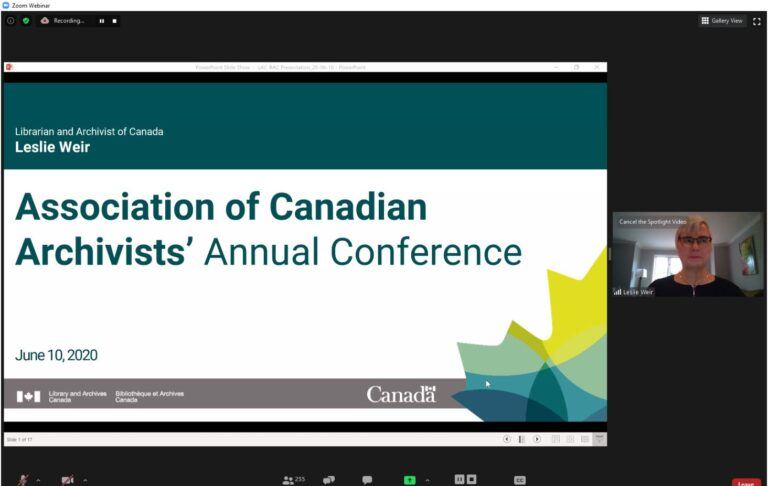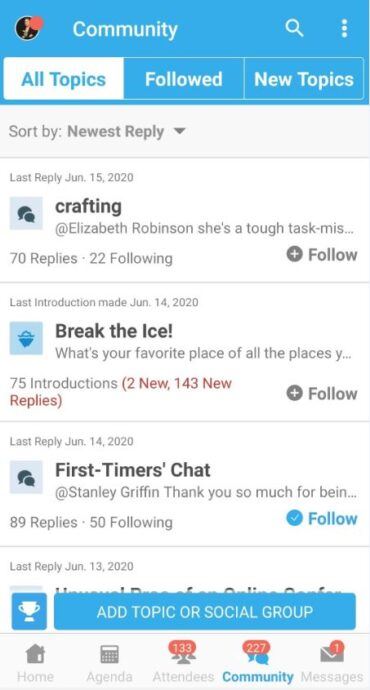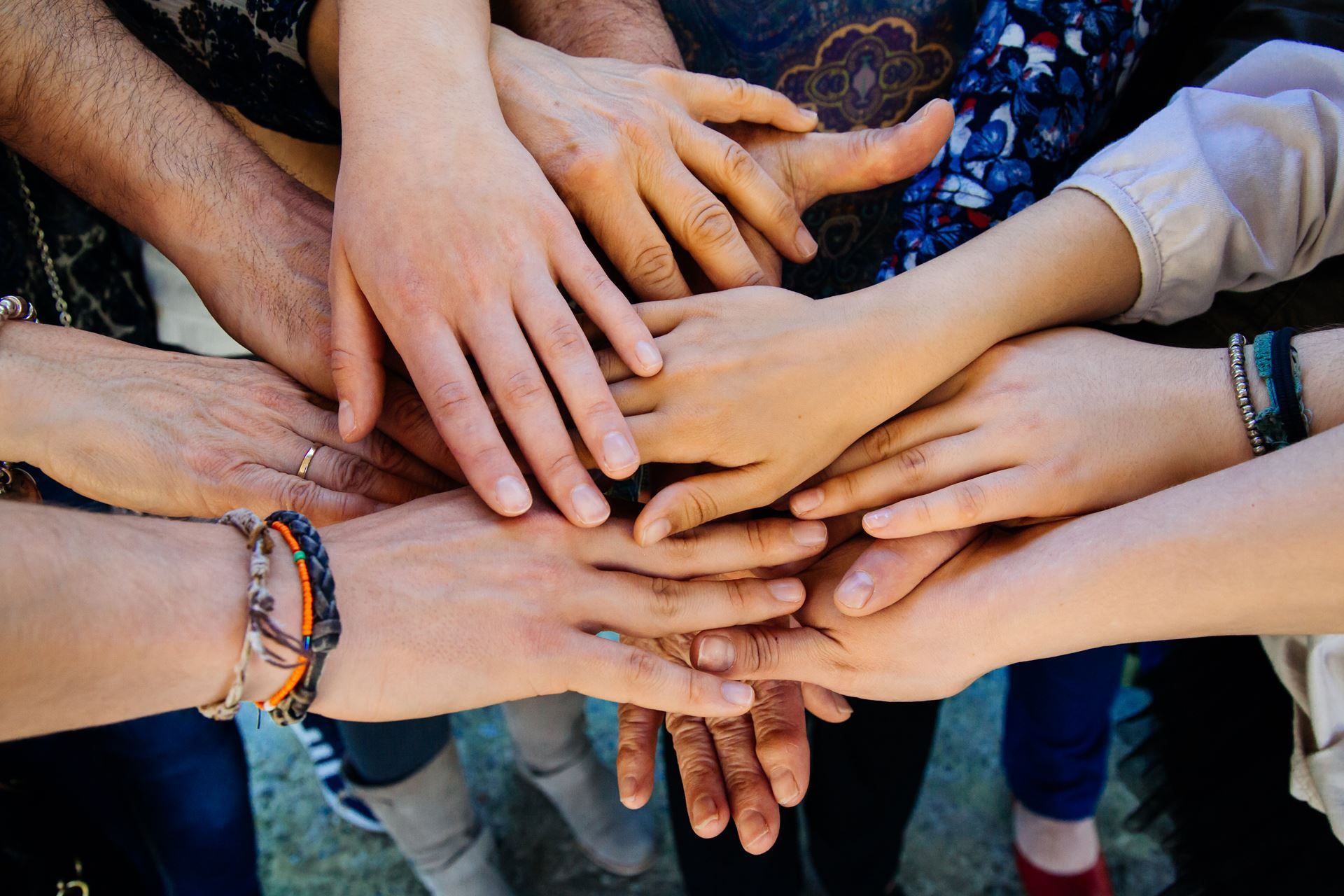
We Saw Things Differently, Reflections on ACA 2020 - The Online Version
Prepared by: Emily Lonie (June 25, 2020)
As one of my final acts as Chair of the 2020 Program Team, I have been asked to reflect on the 45th annual conference of the Association of Canadian Archivists. Wow—where to start? How do you sum up such an incredible and historic experience?
I couldn’t have foreseen it, but as it turned out, our theme for this year’s ACA conference: 20/20 Vision: Seeing Archives Differently, could not have been more appropriate. 2020 has forced us all to see things differently.
When we began planning the conference in 2019, we could never have envisioned that we would not be meeting in person at the University of British Columbia, but instead gathering virtually across the world. It took a lot of courage and vision to see the conference differently and I am so proud of everyone who made ACA 2020 such a powerful and thought-provoking conference.
ACA 2020 was truly historic in many ways. The conference brought together 85 speakers from across Canada and around the world and over 500 attendees! That’s a new ACA attendance record. Through sponsorship from Ancestry and generous donations from members, we were able to provide free registration to nearly 100 students and professionals experiencing precarious employment or job loss. The virtual format provided unparalleled accessibility, affordability, and sustainability, and I would argue a kind of sociability that may not always happen in person (more on that below).
Over three days, the archival community came together to hear evolving ideas and to contemplate new directions and new priorities for the profession. On Day One, we got to “meet” Leslie Weir, the new Librarian and Archivist of Canada, and hear about her thoughts for the future of Library and Archives Canada.

Afterwards, we got to toast the tremendous impact of Terry Cook while launching the new book, “All Shook Up” The Archival Legacy of Terry Cook. The book launch was sweet and surprisingly intimate for a virtual event. It featured many of Terry’s friends and colleagues each providing their memories of him and their impressions of the impact he made on the archival communities around the world. If you missed the session, you can check it out on Facebook (where it has been viewed nearly 3500 times!) You can also pre-order the book now from the Society of American Archivists’ book store.

On Day Two, we were incredibly privileged to hear a moving and powerful opening plenary from Artist Carey Newman, Archivist Heather Bidzinski, and Western Arts Correspondent for the Globe and Mail Marsha Lederman. The three spoke about the Witness Blanket, a substantial (in both size and impact) piece of art that stands as a symbol of ongoing reconciliation and as a model for incorporating Indigenous and Western legal frameworks in order to prioritize responsibilities over ownership. I would highly encourage everyone to watch the documentary that was made about the creation of the Witness Blanket and its tour around the country. Carey Newman and Kirstie Hudson have also published a stunning book, “Picking Up the Pieces: Residential School Memories and the Making of the Witness Blanket,” charting the project’s course from concept to completion. The book can be purchased from many retailers or directly from the publisher.
The emotional opening plenary was followed by seven sessions including a Forum for BIPOC archivists, a virtual Poster Session, and subject matter that included cultural memory, artist-run centre archives, the decolonization of archival theory, awareness-building, and challenging colonial archives.
Day Two wrapped with a dynamic and thought-provoking plenary about how archivists can consider the environmental impacts of their work. The#ArchivistsforClimateAction plenary brought together archivist/activists from around North America to discuss the work they did as part of a worldwide Twitter Teach-in during the Global Climate Strike on Friday, September 20, 2019. The group (Itza Carbajal, Ted Lee, Sam Winn, Krista Jamieson, Fletcher Durant, and Jessica Bushey) offered first a provocation – “For memory workers, the existential uncertainties of the Anthropocene should prompt a crisis of purpose: if there will be no one to remember what was, what will have been the purposes of memory work?”; followed by a challenge – “How can we move towards an ethos of maintenance and intentional degrowth?”; and then an invitation – asking attendees to think about “what could emerge from “the end of archives” as we know them? Panelists then reflected on a series of questions about the sustainability of archival practices. It was heavy stuff but the session concluded with discussions of how to manage the feeling of dread and how to imagine a new future.
On Day Three, we had an excellent series of nine sessions that covered the preservation of moving images, representation, access to information, digital preservation, reconciliation, data sovereignty, professionalization, trauma-informed practice, outreach, and education. There was a brilliant student session that featured three new members of the archival community sharing their important research. We were also privileged to hear from a panel of incredible archivists who argued that it is crucial to acknowledge and support archivists’ emotional work.
Michelle Caswell gave the closing plenary where she argued that we need to question the valorization of reason and embrace feeling, considering both personal positionality and structural oppression. Caswell fired everyone up with her inspiring and necessary call to action to use archival skills to dismantle systems of oppression. I think I heard a virtual mic drop at the end and I know that there were individual standing ovations happening in many time zones around the world.
I have now had a few weeks to reflect on the conference and I wanted to share my thoughts on some of the advantages of the virtual format:
-
Accessibility: If you haven’t already had the chance, I would highly encourage you to read Sam Winn’s eloquent article about her experience at ACA 2020. The virtual conference provided unprecedented accessibility. Many remarked that they were able to feel comfortable during sessions, see to their needs as they wished, and catch up on recorded panels they may have missed due to scheduling conflicts, time zones, or conference burnout. Attending an in-person conference can be an exhausting prospect. The Virtual ACA let you do the conference your way.
-
Affordability: ACA 2020 was affordable for participants and it was affordable for the Association. Given that we didn’t have to feed anyone or pay exorbitant AV costs to a hotel chain, the registration fees for the conference were incredibly low ($100 for members, $200 for non-members, $50 for students). Over and above the reasonable fee structure, ninety-eight students and individuals experiencing job loss or precarious employment were able to register for free. In terms of costs for the Association, the Virtual ACA cost a fraction of what it costs to host an in-person conference. For the price of coffee and snacks for one morning break, we were able to purchase a video-conferencing service (Zoom), a hosting platform (Whova), offer professional closed captioning (big thanks to Joanne McKenzie and Sandra Burns!), support a local charity (the Downtown Eastside Women’s Centre), provide honoraria for invited speakers, and make recordings available to attendees after the conference through the Whova platform—all for between ten and fifteen thousand dollars (exact amount pending). Compare that to the more than one hundred thousand dollars it costs to put on an in-person event and you start to question how necessary it is to sit in a room together.
-
Sustainability: 500 people from across North America and around the world attended a conference with zero carbon emissions from travel. That’s significant.
-
Sociability: Of course we all missed seeing our colleagues and friends in person. Of course we all missed catching up over dinner, sharing some drinks at the pub, or playing a rousing game of baseball for all the regional glory. There is no substitute for in-person human contact. But, I would argue that the virtual conference—through the Whova app—gave attendees an opportunity to socialize in a way that is unmatched in person. It is far less intimidating to send someone a message in an app than it is to walk up to a stranger and introduce yourself. Whova made it possible to “meet” hundreds of people on your own terms. I now know about all of the talented artists and crafters out there in the archival community because they were able to share photos of their work. Loads of people shared adorable photographs of their furry friends and more than seventy-five people used the ice-breaker function to introduce themselves so we could all get to know each other better. According to Whova, the typical average number of community messages sent through the app is 1204. Attendees at ACA 2020 sent more than 4100 messages to each other! And the messages keep coming while attendees continue to take advantage of the Whova app. I know we missed being together, but it’s hard to argue that ACA 2020 wasn’t social!

The conference left me inspired and exhausted. I can only hope that you felt the same way. If so, then I think we did our job well. It has been such an honour to serve as Chair of the Program Team this year and I want to close with a million thank yous to Jo McCutcheon and my Program Team – Melissa Adams, Alexandra Alisauskas, Grant Hurley, Emily MacDonald, Amanda Oliver, Emily Sommers, and Tessa Walsh. I leave you all now in the capable hands of Grant Hurley for the 2021 conference. Cheers everyone!
Emily Lonie is the City Archivist for the City of Coquitlam Archives. Originally from Ottawa, she began her career as government records archivist with Library and Archives Canada before moving to the west coast. She is the writer and curator of the archives blog www.thingsimfondsof.com.
Our Community
| Public Awareness & Advocacy
| Resources
| Submissions
|
Contact Us
Suite 1912-130 Albert Street
Ottawa, Ontario K1P 5G4
Email: aca@archivists.ca
The ACA office is located on the unceded, unsurrendered Territory of the Anishinaabe Algonquin Nation whose presence here reaches back to time immemorial.
Privacy & Confidentiality - Code of Ethics & Professional Conduct
Copyright © 2023 - The Association of Canadian Archivists




